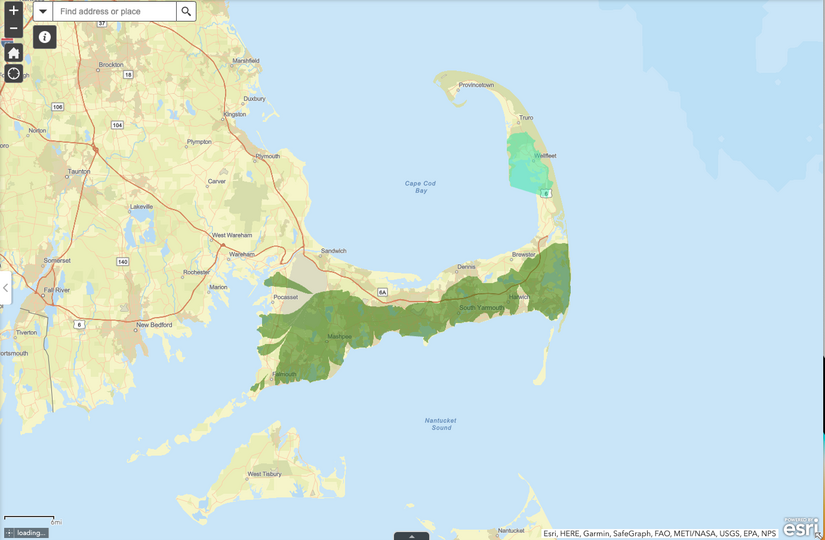Title V Regulations for Nitrogen Sensitive Areas
The Massachusetts Department of Environmental Protection (MassDEP) has recently promulgated new regulations amending Title V for new Nitrogen Sensitive Areas (NSAs) in Barnstable County.
Background
Title V in Massachusetts governs the construction and maintenance of septic systems and the transport of septic-system waste.
The MassDEP has recently promulgated new regulations amending Title V for new NSAs in Barnstable County. The new regulations are designed by MassDEP to enhance protection of embayments and estuaries on Cape Cod from nitrogen pollution originating primarily from wastewater. Taken together, these new regulations constitute the settlement of a lawsuit between the Conservation Law Foundation and MassDEP, the Town of Barnstable, and the Town of Mashpee.
Additionally, MassDEP created a new voluntary watershed permit program for towns in Barnstable County as part of the new regulations. If a town chooses to pursue and is subsequently granted a watershed permit, the existing construction within that watershed are EXEMPT from the new Title V regulations as the town will be deemed to be making significant progress towards reducing nitrogen pollution.
What is a Watershed Permit
This new voluntary Watershed Permit provides a watershed permitting approach to control nitrogen and other pollutants from entering the Commonwealth's coastal embayments and estuaries for Barnstable County.
Watersheds within the NSAs will have the option to obtain a Watershed Permit. If a town successfully files for and receives Watershed Permit, the amended Title V Regulations will not take effect in that watershed.
A Watershed Permit establishes performance standards, authorized activities, and the timeframes that will be utilized under an adaptive management framework to achieve nutrient load reductions that are necessary to meet the specific water quality and habitat quality restoration goals that have been identified in a watershed analysis as being necessary to meet the designated uses of the Massachusetts Surface Water Quality Standards, for the nutrients identified in the watershed analysis.
*A town has 2 years from July 7, 2023 to file a notice of intent to obtain a Watershed Permit. Doing so, will stay the effect of the new Title V Regulations for NSAs.
**As of July 7th, 2025, all 15 towns in Barnstable County had filed a Notice of Intent to obtain a Watershed Permit, giving them 20 years to design and implement comprehensive wastewater management plans for their impaired watersheds.
Amended Title V Regulations
As of July 7th, 2025, all 15 towns in Barnstable County have filed a Notice of Intent to obtain a Watershed Permit, giving them 20 years to design and implement comprehensive wastewater management plans for their impaired watersheds. This means that most homeowners will not need to upgrade to an IA system before 2030.
All towns are now in the process of drafting their comprehensive management plans; CCIAOR will monitor the progress of these plans and share information as it is received.
Nitrogen Sensitive Area Property Lookup

On July 7, 2023, there will be an updated definition for NSAs in Barnstable County from MassDEP. These areas are mostly contained on the south side of Barnstable County.
The watersheds in this newly designated area will have two years from becoming a NSA to obtain a Watershed Permit and if they do seek a permit, the individual properties will be exempt from the new Title V Regulations.
Click the button below to check if an address is in a Nitrogen Sensitive Area
Disclosure Requirements
Both Chapter 93A and the new Title V Regulations require disclosure of the property in a NSA for those affected properties.
The disclosure requirement reads,
"Prior to any transfer of title for property where the facility is located, the transferor shall disclose to the transferee and Board of Health whether the facility is subject to an upgrade requiring Best Available Nitrogen Reducing Technology."
For all properties that are in the newly designated NSAs, you need to disclose prior to closing that the property is within the area - even for properties already under contract.
CCIAOR has provided a disclosure for you to use, below.
Barnstable Comprehensive Wastewater Disclosure
The disclosure should be given for all properties that fall within the Natural Resource NSAs regardless if the town watershed has already received a Watershed Permit.
Title V Webinar Recap
Watch a full video recap of our recent webinar on the new Title V regulations. *Note: this webinar was recorded in July of 2023.
